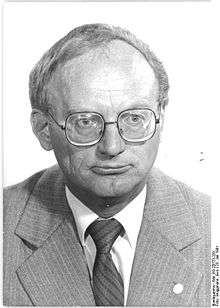Hermann Kant
| Hermann Kant | |
|---|---|
 Hermann Kant | |
| Born |
June 14, 1926 Hamburg, Germany |
| Died |
August 14, 2016 (aged 90) Neustrelitz, Germany |
| Alma mater | Humboldt University of Berlin |
| Occupation | German Author |
| Awards | Heinrich Mann Prize (1967) |
Hermann Kant (June 14, 1926 – August 14, 2016)[1] was a German writer noted for his writings during the time of East Germany.[2] He won the Heinrich Mann Prize in 1967.
Early life
Hermann Kant was born on June 14, 1926, in Hamburg, Germany the son of a factory worker and a gardener born into poverty. His younger brother, Uwe Kant, became a well-known children's author. Because of the impending bombing of Hamburg during the Second World War, the family moved to Parchim in 1940, where his paternal grandfather lived as a master potter. After passing elementary school he began an electrician apprenticeship in Parchim, which he completed in 1944. On December 8, 1944, he was drafted into the German Military. He became a Polish POW, was held in Warsaw's Mokotów Prison and later was transferred to a labor camp, which was located on the site of the former Warsaw Ghetto. He was the co-founder of the antifascist committee and teacher at the Antifa Central School. During this time he met the writer Anna Seghers, who would have a lasting impression on him. After being released as a prisoner of war in 1949, he moved to East Germany and joined the Socialist Unity Party of Germany.
Kant finished High School in 1952 at the Workers' and Peasants Faculty in Greifswald. From 1952 to 1956 he studied German literature at the Humboldt University of Berlin . His thesis was entitled "The representation of the ideological-political structure of the German fascist army in Pliviers novel Stalingrad." After graduating he worked until 1957 as a research assistant at the University and was also the editor of the student magazine, Tua res, from 1957 to 1959. In 1960, Kant became a freelance writer and member of the Writers' Union of East Germany.
Writing career
Kant's first book was published in 1962 as a collection of short stories entitled, A Little South Seas. The book showed stylistic influences adopted from the American Short Story genre and authors such as O. Henry, giving the East German literature a new satirical and a plainly ironic style.[3]
In his first novel, The Aula (1965), Kant described his own experiences at the Workers 'and Peasants' Facility. In the book, the closure of the facility is an occasion for a graduation, for which the main character is to deliver a speech, which determines the fate of their fellow students and thus a part of their own lives in the early days of East Germany. "Kant's most famous and best novel"[4] made him famous overnight in both the East and the West, while the book also being considered controversial in both German states. In East Germany most viewed the book as a "partisan commitment" of Kantian protagonists devoted to the "socialist movement",[5] Marcel Reich-Ranicki remarked that Kant was too timid to write about the real the conditions that existed in East Germany.[6]
In 1972, the novel was published in a second edition, where he perfected his writing style. The publication was always seen as a false depiction of parts of the East German cultural bureaucracy, and Kant was criticized for painting a misrepresentation of the social conflict.[7] In 1976 he began developing the Bildungsroman style . He tells the story of Mark Niebuhr, a mistakenly labeled as German war criminals. With the protagonist socialist Roman left Kant's "hero" with nothing to do. The story describes a "conversion" or "enlightenment", but also knowledge of "disenchantment".[8] The writing was depicted in the 1983 DEFA film; Staying Alive .
In addition, Kant wrote occasionally scripts and screenplays, including for Günter Reisch's feature film Ach du fröhliche... (1962 - with supporting role) and, based on his own novel, turned into a made for TV movie; Mitten im kalten Winter (1968).
From the 1970s, Kant took despite its rather narrow view a "weighty significance" in the contemporary literature of East Germany, and had "helped shape minds."[9] Heiner Müller described Kant's narrative Bronze Age (1986) in his autobiography as "the sharpest East German satire" which he had read in recent years. For many other colleagues, literary and social critic Kant was opposed to the "pattern and quintessential as maneuverable as windy compromise literati"[10] become the bridge between conformism and confrontation; an impression that was reinforced by his vacillation as a literary functionary. So Kant remained in East and West "one of the most controversial figures in East German literature".[11]
References
- ↑ https://www.neues-deutschland.de/artikel/1022042.hermann-kant-ist-tot.html
- ↑ "Hermann Kant 80" (in German). Welt Online. June 14, 2006. Retrieved January 26, 2011.
- ↑ s. Manfred Durzak: Die deutsche Kurzgeschichte der Gegenwart. Autorenporträts, Werkstattgespräche, Interpretationen. 3., erw. Aufl. Würzburg 2002, S. 285
- ↑ Hermann Wiegmann: Die deutsche Literatur des 20. Jahrhunderts. Würzburg 2005, S. 336
- ↑ Maria-Verena Leistner: Hermann Kants Roman ‚Die Aula‘. In: Deutsch als Fremdsprache. 2/1967, S. 108–113, hier S. 112 f
- ↑ Marcel Reich-Ranicki: Ein Land des Lächelns. In: Zur Literatur der DDR. München 1974, S. 83–89 (zuerst in: Die Zeit, 1. April 1966)
- ↑ s. Kant: Abspann. S. 286 ff.; Corino: Akte. S. 41 ff.
- ↑ Heinrich Küntzel: Von ‚Abschied‘ bis ‚Atemlos‘. Über die Poetik des Romans, insbesondere des Bildungs- und Entwicklungsromans in der DDR. In: Jos Hoogeveen, Gerd Labroisse (Hrsg.): DDR-Roman und Literaturgesellschaft. Amsterdam 1981 (Amsterdamer Beiträge zur neueren Germanistik. 11–12), S. 1–32, hier: S. 21 f.
- ↑ Durzak: Kurzgeschichte. S. 284
- ↑ Helmut Fuhrmann: Vorausgeworfene Schatten. Literatur in der DDR – DDR in der Literatur. Würzburg 2003, S. 19
- ↑ Wiegmann: Literatur. S. 336
External links
 Media related to Hermann Kant at Wikimedia Commons
Media related to Hermann Kant at Wikimedia Commons- Hermann Kant at the Internet Movie Database